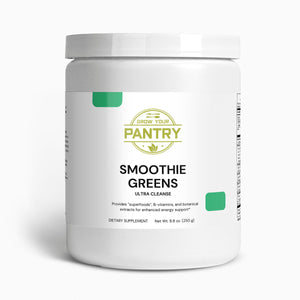Wheatgrass And Pregnancy: The Thorough Guide
The FDA prohibits the consumption of raw sprouts of any kind, including wheatgrass during pregnancy until they are cooked thoroughly. That being said, there's still much controversy surrounding the consumption of wheatgrass during pregnancy. On the one hand, wheatgrass is a superfood full of essential nutrients that are much required during pregnancy.
On the other, raw wheatgrass has a high likelihood of getting contaminated with bacterial and fungi culture during the sprouting stage, which can lead to harmful infections. This guide delves deeper into wheatgrass, its health benefits and possible risks of consuming it during pregnancy.
Disclaimer: This is not certified medical advice - we have gathered resources from around the web with links for you to check out. If you have any concerns or worries, you should seek professional medical advice immediately, and always follow your physician's advice.
Not Much Time? Skip To What You'd Like To Learn...
-
What Is Wheatgrass?
-
Risks Of Consuming Wheatgrass When Pregnant
-
Wheatgrass And Fertility
-
Wheatgrass And Breastfeeding
-
Benefits Of Wheatgrass During Pregnancy
-
Wheatgrass Side Effects
-
Common Questions
What Is Wheatgrass?
Wheatgrass refers to freshly sprouted wheat shoots which are 6 to 10 days old. The sprouting process kicks off with a 12-hour prolonged activation soak followed by regular rinsing and draining every 8 to 12 hours. After the seeds are soaked for the first time, the germination process begins, which results in nutrients increasing as the stored nutrients get broken down into simple molecules.
Risks Of Consuming Wheatgrass When Pregnant
1. Bacterial Infection
The sprouting process requires regularly rinsing the wheatgrass sprouts as they grow; this introduces the possibility of bacterial and fungal contamination. These harmful cultures can easily lead to infections due to the fact that pregnancy causes the immune system to weaken so the body cannot fight off such infections as easily. For this reason, the United Kingdom Nation Health Service (NHS) recommends that all raw sprouts should be avoided during pregnancy.
Ref: nhs.gov
2. Allergic Reaction
Wheatgrass can trigger wheat and grass allergic reactions which can lead to runny nose, itchy throat and puffy eyes. Pregnant women with an existing gluten allergy and celiac disease have an increased probability of developing allergic reactions after consuming raw wheatgrass.
3. Miscarriage
Wheatgrass is packed full of antioxidants and other detoxifiers which serve to flush out toxins from the body. However, this detoxifying action may act directly on the growing fetus leading to a miscarriage or other developmental defects.
4. Loss Of Critical Nutrients
Wheatgrass can trigger persistent diarrhea and vomiting, which leads to a purge of critical nutrients from the body. This can have an adverse effect on the growing fetus due to lack of nutrients such as vitamins.
5. Increased Nausea
Pregnancy is marked with occasional morning sickness and alleviated nausea. Upon consuming wheatgrass, nausea will drastically increase to unhealthy levels. This can lead to dehydration and fatigue.
NHS Advice For Consuming Wheatgrass When Pregnant
The NHS prohibits the use of wheatgrass during pregnancy due to the risk of developing infections from the bacterial contamination that often occurs during sprouting.
Ref: mayoclinic.org
Wheatgrass And Fertility
Wheatgrass contains increased amounts of folic acid which promotes increased sperm count, DNA stability and sperm quality. Wheatgrass also contains chlorophyll which reduces inflammation, improves cell structure and promotes regular menstrual cycles.
Ref: pubmed.org
Wheatgrass And Breastfeeding
Wheatgrass should be avoided while breastfeeding as it can trigger allergic reactions. The situation may worsen if the mother or the breastfeeding child is allergic to either wheat or grass.
Types Of Wheatgrass And Advice When Pregnant
factor |
Raw Wheatgrass |
Wheatgrass Juice |
Wheatgrass Shots |
Wheatgrass Powder |
Can You Consume During Pregnancy? |
NO |
NO |
NO |
NO |
Can You Consume During Breastfeeding? |
NO |
NO |
NO |
NO |
Can You Consume While Trying To Conceive? |
YES |
YES |
YES |
YES |
Benefits Of Wheatgrass During Pregnancy
While wheatgrass isn't recommended during pregnancy, there are ways to mitigate the risks of consumption, and with your doctor's advice, it's possible to consume manageable amounts of this superfood still.
1. Rich In Essential Nutrients
Like any other superfood, wheatgrass is packed full of essential minerals such as iron, calcium, and magnesium. Wheatgrass also contains 17 amino acids, vitamins A, B complex, C, K, and E. An eight grams serving of wheatgrass contains:
-
Calories: 25
-
Protein: 1g
-
Carbohydrates: 6 g
-
Fiber: 4 g
-
Calcium: 24 mg
-
Iron: 1 mg
-
Vitamin K: 86 micrograms equivalent to 70% daily value
2. Detoxification
Wheatgrass is considered to be a healthy natural detox due to its high concentration of chlorophyll and antioxidants. Chlorophyll plays an essential role in detoxifying the body and supporting the development of healthy liver function. The antioxidants, on the other hand, react with harmful free radicals before they can cause actual damage to healthy body cells.
Ref: functionalfoodscenter.com
3. Improving Digestion
Wheatgrass is rich in enzymes which are essential in breaking down food and absorption of nutrients. The detoxifying effect of wheatgrass also plays a critical role in cleaning up the intestines. This reduces the occurrence of bloating and abdominal discomfort. Wheatgrass can, therefore, alleviate irritable bowel syndrome and constipation.
Ref: ncbi.gov
4. Boosting Metabolism
Drinking wheatgrass aids in increasing the metabolism rate, which in turn aids in weight loss. Wheatgrass is also full of fiber while still retaining its nutrient density; as a result, you will feel fuller much faster and for longer. This will help curb the cravings.
Ref: ncbi.gov
5. Reducing Cholesterol
Wheatgrass has been shown to reduce the amount of bad LDL cholesterol and to increase the amount of good HDL cholesterol. Reduced cholesterol level plays a critical; role in reducing the risk of heart disease and related complications—wheatgrass aids in weight loss which in turn encourages the reduction of cholesterol.
Ref: ncbi.gov
6. Boosting The Immune System
Wheatgrass contains vitamins which enhance the function of the immune system. A more robust immune system translates to faster recovery and fewer chances of developing an illness.
Ref: functionalfoods.net
7. Lowering Blood Pressure
Wheatgrass is rich in chlorophyll molecules which are similar to red blood cell's hemoglobin. A regular intake of chlorophyll, therefore, results in increased blood cell count, which helps to normalize blood pressure. Chlorophyll also plays a significant role in purifying blood while also improving blood circulation throughout the body.
Ref: rojji.com
Wheatgrass Side Effects
-
Fever
-
Stomach upset
-
Constipation
-
Headache
-
Nausea
Common Questions
Is It Safe To Take Wheatgrass While Pregnant?
No, wheatgrass should be avoided during pregnancy due to the risk of developing a bacterial infection.
How Much Wheatgrass Should You Drink A Day?
Typically, it's healthy to drink 1 to 4 ounces of wheatgrass juice every day.
What Does Wheatgrass Do To Your Body?
Wheatgrass detoxifies the body and strengthens the immune system. However, the purging process might be riddled with nausea, diarrhea and vomiting.
What Are The Side Effects Of Wheatgrass?
Some of the side effects of wheatgrass include fever, headache, nausea and constipation.
Why Is Wheatgrass Bad For You?
Wheatgrass can be contaminated with bacteria and fungi cultures which leads to infections.
What Is The Best Time To Drink Wheatgrass Juice?
The best time to take wheatgrass is during early in the morning on an empty stomach before you take your breakfast.
Who Should Not Take Wheatgrass?
Wheatgrass should not be taken by pregnant or breastfeeding mothers and anyone with a weakened immune system such as AIDS patients and patients on immunosuppressants.
Can You Drink Wheatgrass Every Day?
Yes, wheatgrass juice can be consumed on a daily basis; however, it’s recommended that you seek medical advice on the same.
Does Wheatgrass Make You Poop?
Yes, wheatgrass aids in relieving constipation.
What Are Pregnancy Superfoods?
These are foods that are said to contain multiple essential nutrients ranging from minerals to vitamins and amino acids.







